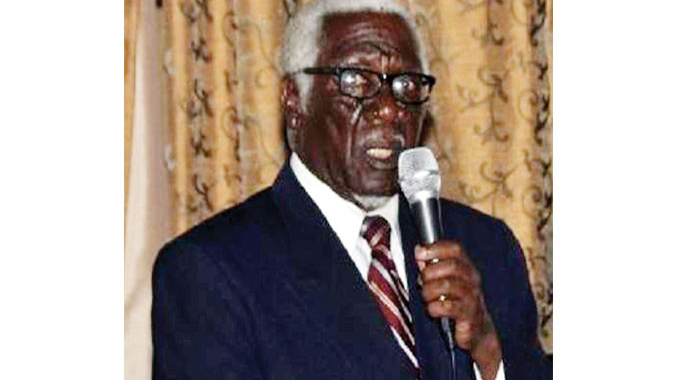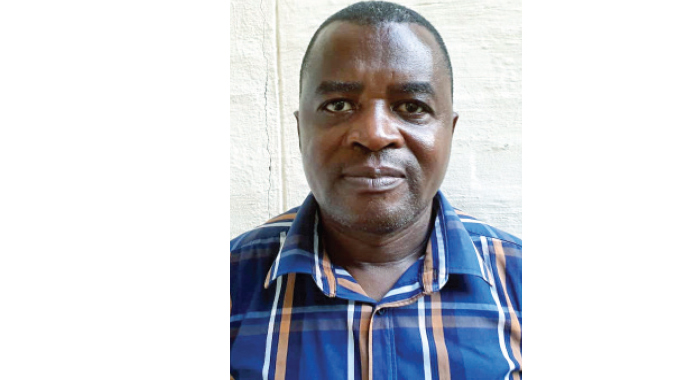Call to declare Cde Saul Gwakuba Ndlovu a national hero posthumously

Bongani Ndlovu, Chronicle Reporter
GOVERNMENT has been urged to declare the late veteran journalist, writer and war veteran Cde Saul Gwakuba Ndlovu, a national hero posthumously.
Cde Gwakuba Ndlovu died on July 16 after a heart ailment at the United Bulawayo Hospitals and was buried at Lady Stanley Cemetery in Bulawayo last Friday.
During Cde Gwakuba Ndlovu’s burial last week, his nephew Mr Bulukani Timothy Kumile Masola said as a family they were saddened that his uncle had not been conferred national hero status.
Among those that attended the funeral were Minister of State for Provincial Affairs and Devolution Judith Ncube; Zanu-PF Politburo member and Minister of Women Affairs, Community and Small and Medium Enterprises Development Cde Sithembiso Nyoni; former Transport Minister Cde Nicholas Goche, who married Cde Gwakuba Ndlovu’s cousin; renowned historian Pathisa Nyathi; King Mambo (Mike Moyo); the son of late nationalist and national hero, George Silundika, Felix; and former ZPRA chief of military intelligence and Retired Brigadier-General Abel Mazinyane.
During the liberation struggle, Cde Gwakuba Ndlovu was the director of publicity and information of the Zimbabwe African People’s Union (Zapu), between 1964 and 1978.
He once served as the diplomatic representative for Zapu based in Algeria responsible for Tunisia, Morocco, Mauritania, Niger and Mali.
He also covered countries such as Spain, Portugal, France, Belgium, Luxemburg, the Netherlands and the Federal Republic of Germany.
On behalf of Zapu he participated in a number of the then Organisation of African Unit summits, Afro-Asian People’s Solidarity Organisation meetings, United Nations, anti-colonialism committee conferences, Heads of State and several international journalism conferences at places such as in Prague, Pyongyang, Moscow, Berlin, Cairo, Kinshasa, Rome and New Delhi.
From mid-June to mid-July 1979, Cde Gwakuba Ndlovu and Dr Barnabas Dzingai Mutumbuka undertook a lecture tour in Canada on behalf of the Patriotic Front (PF) to apprise Canadians on the socio-political situation in the then Zimbabwe-Rhodesia and why the PF was strongly opposed to the treacherous Muzorewa-Smith regime.
In 1972, Cde Gwakuba Ndlovu was sent to the Soviet Union by Zapu and among his group were now Brigadier-General (Retired) Abel Mazinyane, Colonel (Retired) Thomas “Menu” Ngwenya, late Cde Jack Amos Ngwenya, Cde Phebione Makonese, Cde Easter Ndiweni and Cde Josiah Ncube.
Cdes Gwakuba Ndlovu, Ngwenya, Ndiweni and Makonese were to do leadership training in the Soviet Union.
The call for Cde Gwakuba Ndlovu to be declared a national hero have since spilled into Parliament.
Before Finance and Economic Development Minister, Professor Mthuli Ncube presented the midterm budget review yesterday, MDC-Alliance legislator for Magwegwe, Mr Anele Ndebele requested the Government to reconsider the conferment of Cde Gwakuba Ndlovu as a national hero.
“Honourable speaker with much ado, let me state for the record, that I have no doubt that Saul Gwakuba Ndlovu is an unquestionable revolutionary, a founding veteran, a stalwart of the struggle, a pioneer and has been honoured by the state as such in the past. He belongs to a crop of veterans of our struggle that joined the struggle perhaps way before all those who are expected to declare him a hero; before they had joined that struggle,” he said.
“Snubbing Saul Gwakuba is snubbing the contribution of ZPRA and as well as that of Zapu to the struggle for Zimbabwe. I duly urge the Government to consider honouring this well deserving hero even posthumously.”
Mr Ndebele said as Zimbabweans they were duty bound to remind the Government to honour heroes in an equal and transparent manner.
“Honourable Speaker, there are some who may feel our fixation with hero statuses is wrong. But I want to argue today that we are duty bound to remind and at times demand, of our own State to honour heroes in an equal and transparent manner.
“We are a diverse people, but we remain one people, in drawing from the pre-colonial and ordinary resistance we must remind each other to use symbols, issues and indeed the selection of our heroes in a manner that recognises our diversity,” said Mr Ndebele.
On Tuesday, MDC-T vice-president Dr Thokozani Khuphe said after Cde Gwakuba Ndlovu’s death, she was saddened that he was not conferred national hero status.
“Thank you, Mr Speaker Sir, I rise on a matter of national public importance. Mr Speaker Sir, two weeks ago, Saul Gwakuba Ndlovu passed on. He was a renowned journalist, a freedom fighter and a senior citizen. Sadly Mr Speaker Sir, I did not see where he was recognised for the role that he played for the nation and for the communities, particularly Matabeleland. I thank you,” said Dr Khuphe.
The Speaker of Parliament, Advocate Jacob Mudenda agreed and said there was no doubt that Cde Gwakuba Ndlovu’s contribution to the liberation struggle was unquestionable.
“We totally agree with you on the assessment of the sterling work done by the late Cde Saul Gwakuba. He is from Matabeleland South and the leadership from Matabeleland South normally should have spoken by writing to the Executive requesting for the status as a formality but there is no doubt about the contribution of the late Cde Saul Gwakuba — there is no doubt. He was one of the pioneers of the liberation struggle,” said Advocate Mudenda.
He urged the August House to raise the issue with the Minister of Home Affairs and Cultural Heritage Kazembe Kazembe to get an explanation.
“He was one of the early recruitees who went outside this country to fight for our liberation. It is a matter that I think you should raise with the Minister of Home Affairs and Cultural Heritage tomorrow so that we get an explanation on whether a letter was written or not. If it was written, why was he not recognised?” said Advocate Mudenda.
Cde Gwakuba Ndlovu was born on 23 September 1934 at Dombodema Mission in Bulilima District, Matabeleland South Province.
After independence Cde Ndlovu joined the Chronicle as a senior editorial staff member. He was later appointed Features and Supplements Editor for both Chronicle and Sunday News.
The late journalist left Chronicle and Sunday News in 1984 to join the Munn Publishing Company where he was the contributing editor and regional manager responsible for Matabeleland, the Midlands, Masvingo, Botswana and Zambia.
He left Munn Publishing Company in September 1987 after he was offered a post by Lonrho Zimbabwe as a Public Relations Executive with responsibility over the same region as that he covered with Munn Publishing. Lonrho Zimbabwe later sent him to Swaziland in January 1988, where his responsibility as a consultant at that country’s official newspaper, The Swazi Observer was to revive that publication by training the workers. — Follow on Twitter @bonganinkunzi








Comments